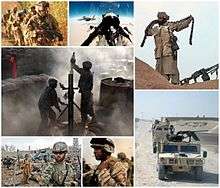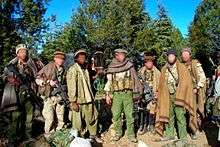
The Taliban has been given the opportunity to surrender all the terrorists in Afghanistan and to close down their camps and operations. Full warning has been given, and time is running out. ~ George W. Bush

It's crazy that you have this today … Pashtuns, Tajiks, Uzbeks, Hazara … They were all ready to buy in to the process … to work under the king's banner for an ethnically balanced Afghanistan. ~ Abdul Haq

It was not clear how to get at al-Qaida in a way to destroy al-Qaida, and we were not prepared, before 9/11, to take down the Taliban. ~ Colin Powell

If the Taliban is given evidence that Osama bin Laden is involved we would be ready to hand him over to a third country. ~ Haji Abdul Kabir
.jpg)
If Americans are convinced that they have solid evidence, we are ready for his trial in Afghanistan, and they have to produce that evidence. ~ Abdul Salam Zaeef
Despite almost continuous combat since the invasion of October 2001, pacification efforts have failed to curtail the Taliban insurgency, largely because the US simply could not control the swelling surplus from the country’s heroin trade. Its opium production surged from around 180 tonnes in 2001 to more than 3,000 tonnes a year after the invasion, and to more than 8,000 by 2007. Every spring, the opium harvest fills the Taliban’s coffers once again, funding wages for a new crop of guerrilla fighters. ~ Alfred W. McCoy
The War in Afghanistan (2001-present) (or the US War in Afghanistan or the Afghanistan War), code named Operation Enduring Freedom (2001–14) and Operation Freedom's Sentinel (2015–present), followed the United States invasion of Afghanistan of 7 October 2001, when the United States of America and its allies successfully drove the Taliban from power in order to deny al-Qaeda a safe base of operations in Afghanistan. Since the initial objectives were completed, a coalition of over 40 countries (including all NATO members) formed a security mission in the country.
Quotes
- There have been calls for a bigger role for private companies in the Afghan war.
Erik Prince, the founder of Blackwater, a private security firm, believes contractors are key to ending the long-running war. He wants to pay "proven veterans" who have served in Afghanistan and use them in combat.
Former Afghan president Hamid Karzai called the proposal a "blatant violation of Afghanistan's national sovereignty".
The numbers have certainly decreased since the significant withdrawal of US and Nato troops in 2014.
In 2012, for example, there were more than 100,000 contractors - armed and unarmed - employed by the US Department of Defense. That included more than 20,000 private security contractors.
The number of private security contractors went below 1,000 at the end of 2016, but has slightly increased since then.- Reality Check BBC News, “What are private security companies doing in Afghanistan?”, (2 December 2018).
- The report drawn up by the commission's staff said: "From the spring of 1997 to September 2001, the US government tried to persuade the Taliban to expel Bin Laden to a country where he could face justice. The efforts employed inducements, warnings and sanctions. All these efforts failed."
At a meeting of the Bush administration's top national security officials on September 10, a three-phase strategy was agreed.
The Taliban would be presented with a final ultimatum to hand over Bin Laden. Failing that, covert military aid would be channeled to anti-Taliban groups. If both those options failed, "the deputies agreed that the United States would seek to overthrow the Taliban regime through more direct action."- Julian Borger, "Bush team 'agreed plan to attack the Taliban the day before September 11'", The Guardian, London, (24 March 2004).
- The Taliban has been given the opportunity to surrender all the terrorists in Afghanistan and to close down their camps and operations. Full warning has been given, and time is running out.
- George W. Bush as qtd. in Nic Robertson and Kelly Wallace, "CNN.com – US rejects Taliban offer to try bin Laden", edition.cnn.com, (10/07/2001).
- Despite efforts by the Taliban to disrupt these critical aid shipments, we will deliver food and seeds, vaccines and medicines by truck, and even by draft animals. Conditions permitting, we will bring help directly to the people of Afghanistan by air drops.
- George W. Bush as qtd. in Nic Robertson and Kelly Wallace, "CNN.com – US rejects Taliban offer to try bin Laden", edition.cnn.com, (10/07/2001).
- We know from long experience in Iraq and Afghanistan to take territory, hold territory, and govern territory and prevent a reemergence of a terrorist group.
- Ashton Carter, interview with Charlie Rose, (February 2016).
- There is no doubt that as the United States winds down the Afghan war — the longest in American history, and one that has cost half a trillion dollars and more than 150,000 lives on all sides — regional adversaries are muscling in.
Saudi Arabia and Pakistan remain the dominant players. But Iran is also making a bold gambit to shape Afghanistan in its favor.- Carlotta Gall, "In Afghanistan, US Exits, and Iran Comes In" The New York Times, (5 August 2017).
- In Afghanistan, the rules of engagement sometimes were stricter than use-of-force rules for civilian police in America. Erica Gaston, a human rights lawyer who studied the military's rules of engagement in Afghanistan, said that especially was true in the later years of the war.
"There was an emphasis on winning hearts and minds, and focusing more on stabilizing communities and protecting the civilian population."- Erica Gaston as quoted in “Military-Trained Police May Be Less Hasty To Shoot, But That Got This Vet Fired”, by Quil Lawrence and Martin Kaste, Morning Edition, NPR, (December 8, 2016)
- It's crazy that you have this today … Pashtuns, Tajiks, Uzbeks, Hazara … They were all ready to buy in to the process … to work under the king's banner for an ethnically balanced Afghanistan.
- Abdul Haq, "The lost lion of Kabul", The New Statesman, 2011.
- The International Criminal Court (ICC's) mandate to investigate war crimes has thus been hampered by the unwillingness of the world’s sole superpower to commit to the organization.... Recent statements...suggest that the United States is now preparing to go to war against the ICC itself, motivated largely by an effort to silence investigations into alleged American war crimes committed in Afghanistan, as well as alleged crimes committed by Israel during the 2014 war in the Gaza Strip...
- Murtaza Hussain, "The U.S. Goes To War Against the ICC to Cover Up Alleged War Crimes in Afghanistan", The Intercept, (12 September 2018).
- "If the Taliban is given evidence that Osama bin Laden is involved" and the bombing campaign stopped, "we would be ready to hand him over to a third country", Mr Kabir added.
- Haji Abdul Kabir, as qtd. in Staff and agencies (14 October 2001). "Bush rejects Taliban offer to hand Bin Laden over", The Guardian, (Archived from the original on 25 August 2013. Retrieved 23 October 2018).
- Before you go to Afghanistan, they give you training. You need to be able to kind of read people. Not everybody over there is a bad guy, but they all dress the same.
- Stephen Mader as quoted in “Military-Trained Police May Be Less Hasty To Shoot, But That Got This Vet Fired”, by Quil Lawrence and Martin Kaste, Morning Edition, NPR, (December 8, 2016)
- After fighting the longest war in its history, the US stands at the brink of defeat in Afghanistan. How could this be possible? How could the world’s sole superpower have battled continuously for more than 16 years – deploying more than 100,000 troops at the conflict’s peak, sacrificing the lives of nearly 2,300 soldiers, spending more than $1tn (£740bn) on its military operations, lavishing a record $100bn more on “nation-building”, helping fund and train an army of 350,000 Afghan allies – and still not be able to pacify one of the world’s most impoverished nations?
- Alfred W McCoy, “How the heroin trade explains the US-UK failure in Afghanistan”, The Guardian, (9 Jan 2018).
- Despite almost continuous combat since the invasion of October 2001, pacification efforts have failed to curtail the Taliban insurgency, largely because the US simply could not control the swelling surplus from the country’s heroin trade. Its opium production surged from around 180 tonnes in 2001 to more than 3,000 tonnes a year after the invasion, and to more than 8,000 by 2007. Every spring, the opium harvest fills the Taliban’s coffers once again, funding wages for a new crop of guerrilla fighters.
- Alfred W McCoy, “How the heroin trade explains the US-UK failure in Afghanistan”, The Guardian, (9 Jan 2018).
- Mr Powell said that before the September 11 attacks, there was no consensus in the Bush administration on how far to go against al-Qaida and the Taliban.
"We did not take into account during that period the kind of actions we were prepared to follow after 9/11," he told the inquiry. "It was not clear how to get at al-Qaida in a way to destroy al-Qaida, and we were not prepared, before 9/11, to take down the Taliban."
Mr Powell vigorously rejected the claim, made by Mr Clarke in a White House memoir published on Monday, that the Bush administration had failed to take the terrorist threat seriously,
"President Bush and his entire national security team understood that terrorism had to be among our highest priorities, and it was," he said. Mr Powell said holding more meetings on the issue would not have accelerated efforts to arm a US hi-tech surveillance drone, the Predator, with missiles so that it could track and, if necessary, attack Bin Laden in Afghanistan - one of the measures urged by Mr Clarke.
The armed Predator was only ready by autumn 2001.- Colin Powell, as qtd. in Julian Borger, "Bush team 'agreed plan to attack the Taliban the day before September 11'", The Guardian, London, (24 March 2004).
- [B]etween 1994 and 1999, an estimated 80,000 to 100,000 Pakistanis trained and fought in Afghanistan.
- Ahmed Rahid, as qtd. in Maley, William (2009). The Afghanistan wars. Palgrave Macmillan. p. 288. ISBN 978-0-230-21313-5.
- For over a decade after the fall of the Taliban regime in December 2001, China preferred to be a mere spectator of the dramatic events unfolding in Afghanistan. Unlike other countries, which sent troops to participate in counterinsurgency operations and contributed financial and other support for reconstruction of the war-ravaged country, Beijing maintained a low profile.
China did not send troops to Afghanistan as it was not interested in being a “subordinate partner” of the U.S.-led alliance in that country. Besides, its goals in Afghanistan were “limited,” Zhao Huasheng, a professor at Fudan University in Shanghai pointed out. Unlike the Western powers, China was not interested in “rebuilding Afghanistan politically” or in altering its “political structures, social patterns or ideological orientations.”
While China avoided participating in multilateral efforts in Afghanistan in the 2002-12 period, it maintained close ties with the Afghan government. It signed the Treaty of Friendship, Cooperation and Good Neighborly Relations with Kabul in 2006. Two years later, Chinese companies won a $3 billion contract to extract copper from the Mes Aynak mines in Logar province.
It was in the context of the U.S. drawdown of troops from Afghanistan and the possibility of the country descending into chaos that China began stepping up its involvement in Afghan affairs in 2012.- Sudha Ramachandran, "Is China Bringing Peace to Afghanistan?" The Diplomat, (06/2018).
- A retired army colonel commissioned by the Pentagon to examine the war in Afghanistan concluded the conflict created conditions that have given "warlordism, banditry and opium production a new lease on life," The New Yorker reported on Sunday.
- Hy Rothstein, The New Yorker, (Sunday, 3 April 2004); as quoted in Channel news Asia archived from the original on (2004-04-05).
- America has given evidence to other countries, we do not say anything. If Americans are convinced that they have solid evidence, we are ready for his trial in Afghanistan, and they have to produce that evidence."
- Abdul Salam Zaeef, made the offer at a news conference in Islamabad Nic Robertson and Kelly Wallace, "CNN.com – US rejects Taliban offer to try bin Laden", edition.cnn.com, (October 7, 2001).
Dialogue
- Huey: So colonel, you guys aren’t dropping food anymore? What happened to all that concern about the starving Afghan people?
- Pentagon:Yeah, well…they’re not, uh, starving anymore.
- Huey: Is that right?
- Pentagon: Yep. Hey told us they’re all full now. Couldn’t eat another bite.
- Huey: Amazing, I wonder what was in those food packets.
- Pentagon: Well, that’s classified but…let’s just say a snickers really satisfies…
- Aaron McGruder, The Boondocks, (9/20/2002).
See also
External links
This article is issued from
Wikiquote.
The text is licensed under Creative
Commons - Attribution - Sharealike.
Additional terms may apply for the media files.